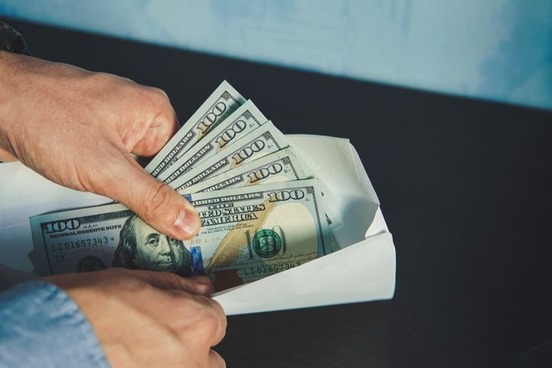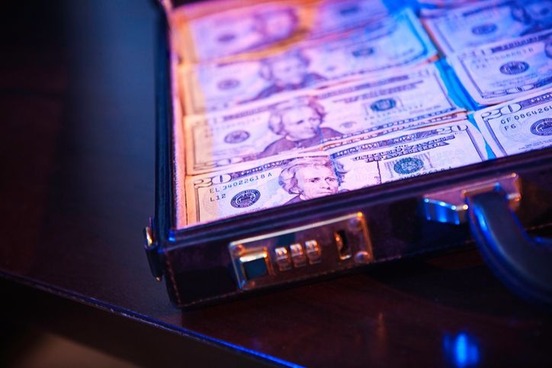
Perjury
Definition - the act or crime of knowingly making a false statement (as about a material matter) while under oath or bound by an affirmation or other officially prescribed declaration that what one says, writes, or claims is true
The Latinate prefix found at the beginning of perjury (per-) may mean a number of different things in English, such as "through," "throughout," or "containing the largest possible or a relatively large proportion of a (specified) chemical element especially as a result of exhaustive substitution for hydrogen or of exhaustive addition in an organic compound or group." However, in Latin per- could also mean "harmfully," and this is the one which is attached to perjury. If one commits perjury one is a perjurer, the adjectival form of the word is perjurious, and the adverb is perjuriously.
A man once in court wouldn't tell
the truth, and it didn't go well,
Perjuriously
he spoke, so you see
he finds himself now in a cell

Kickback
Definition - a percentage payment exacted as a condition for granting assistance by one in a position to open up or control a source of income or gain
Kickbacks aren't always illegal, and also do not necessarily have to refer to money given in a quid pro quo manner. The word may refer to such things as "a sharp violent reaction," which was commonly applied in the early 20th century to something that automobiles occasionally would do. The monetary sense of the word likewise dates to the first half of the 20th century, and is often applied to the demand for money in exchange for job placement or some similar concession.
Prushansky admitted he had taken taken in procuring "kick-backs," or portions of salary from other painters for a man described as Sam.
— New York Herald Tribune, 6 Jan., 1934

Launder
Definition - to transfer (money or instruments deriving from illegal activity) so as to conceal the true nature and source
Launder has been in English as a verb since the 17th century, and despite over 350 years of common use did not pick up many figurative meanings until recently. The 'washing' of money or funds dates to the latter half of the 20th century. Although it had previously been speculated that this sense arose from the Watergate investigations the word was applied to financial chicanery engaged in by non-political criminals prior to this.
In underworld parlance, the process is known variously as "laundering," "sudsing" or "dry-cleaning" money.
— Newsday (Long Island, NY) 6 Oct. 1967"Normally," he explained,"payoff money is funneled into a dummy corporation, which pays the required corporate taxes. The remaining funds have been 'laundered' and are then available for use."
— The Los Angeles Times, 5 Apr. 1968

Extortion
Definition - the act or practice of extorting especially money or other property
Extortion has an additional specific meaning: "the act or practice of extorting by a public official acting under color of office." The word may be traced, fittingly enough, to the Latin extortio, meaning "torture." Should you be unfortunate enough to make the acquaintance of one who engages in this practice you may refer to them as either an extortioner or an extortionist.
No unrighteous person what ever, whether fornicator, adulterer, reviler, drunkard, covetous person, extortioner, shal inherit the kingdome of heaven: but I am so, and so; therefore in this estate, I shall never get heaven.
— Robert Abbot, Foure Sermons, 1639

Hush money
Definition - money paid so that someone will keep information secret : money that a person pays someone to hush something up
Hush money sounds like something one gives to one's children while dining out at a fancy restaurant, in the hopes that they will be quiet and let the adults have a conversation. While we have no evidence that this term has been used in this fashion we also have no proof that it hasn't, so if you are in the habit of bribing your spawn you may refer to it thusly. The commonly accepted use of the word is fairly old, dating back to the 17th century.
THOMAS Foster saith, that he was Coachman to Mr. Germaine, and carried the Dutchess of Norfolk often, about two Years since in his Coach, and brought her home, and the Footmen have had four Half-Crowns given them, and Martin a Dutchman his helper, called it Hush-Money.
— Henry Howard, His Grace the Duke of Norfolk's Charge Against the Dutchess, 1692Who are in Places we may find out, but God knows who have Pensions, yet every man that made the least observation can remember that some who opened loudly at the beginning of the last Sessions, who came up as eager as is possible for Reformation, had their Mouths soon stopped with Hush-money.
— Charlwood Lawton, A Short State of our Condition,1693

Racketeer
Definition - one who obtains money by an illegal enterprise usually involving intimidation
A racketeer is someone who makes money through their involvement with the rackets. There are a number of distinct meanings and senses of racket; the racketeer one may mean either "a loud confused noise" or "a dishonest scheme for obtaining money." The etymology of this racket is unknown, and the word does not share an origin with the other kind, the thing you hit tennis balls and shuttlecocks with. That one came into English from Middle French, after a long and winding path; it is thought to have come from a modification of the Arabic word for "wrist," rusgh.
Argonia knows its old-time rackets and racketeers no more. They have all emigrated to Kansas City which emulates Chicago in energy, and excels it in wickedness.
— The Atlanta Constitution, 22 Jan. 1888

Boodle
Definition - money paid or taken for votes or political favors : bribe money
It has been said that bribe is an ugly word. We have no feelings on this matter, but do have the desire to assist those who would prefer an alternative. Boodle (which comes from the Dutch word boedel, meaning "estate, lot," and also serves as the foundation for caboodle) has a softer ring to it. Furthermore, boodle can mean "a large amount of (non-bribe) money," or "a collection or lot of people," so it might be used with more innocent implications.
Many U. S. citizens are large property holders in Cuba. They have paid boodle to the Spanish civil authorities to escape their just share of taxation, and they pay boodle to the military authorities for the services of troops to protect their property from being burned by the rebels.
— The Gazette (Montreal, Can.), 5 Jul. 1897

Suborn
Definition - to induce to commit perjury; also : to obtain (perjured testimony) from a witness
In addition to inducing perjury, suborn may have a broader meaning, such as "to induce secretly to do an unlawful thing." The word, which comes to English from the Latin subornare (“to secretly furnish or equip”), has been making criminal defendants uncomfortable since the early 16th century. One who suborns is a suborner, and an act or instance of suborning is a subornation. The word is often used in strictly legal contexts, but may also be found used in a figurative manner.
To see a Gentleman of Estate, out of the Usurer's reach, and without colour of Exigence, not rashly, but industriously and with great ostentation of wisdom, for sorry pelf and lucre, expose himself, with all his hopes and advantages, to the venture (indeed certain mischief) of an unworthy Match; what is it but to be suborn'd to his own manifest wrong, and hired as it were to destroy himself? such errour being every way surrounded with repentance.
— A.B., A Letter of Advice Concerning Marriage by A.B., 1676

Plead the Fifth
Definition - to refuse to answer questions in a court of law because the answers might be harmful to one or might show that one has committed a crime
The phrase plead the Fifth (also take the Fifth), is frequently employed figuratively, simply meaning that one declines to answer a question which might prove in some way to be incriminating. The Fifth is the Fifth Amendment of the U.S. Constitution, which states that citizens of the U.S. cannot be required to give testimony that could be used against them in a court of law. Although it may have had occasional use earlier, pleading the Fifth came into broad use during the McCarthy hearings, when it was invoked by a number of those who testified before the Senate.
"I would have to say I am not a Communist party member today," replied Drozdoff, "nor was I during the years when I was employed in the OSS and State Department.Beyond that I shall have to plead the Fifth Amendment."
— Cleveland Plain Dealer, 25 Oct. 1952

Exaction
Definition - the levying or demanding of some benefit (such as a fee or gratuity) that is not lawfully or properly due : extortion
The earliest sense of exaction was simply "the act or process of exacting," and did not necessarily carry any meaning of illegality. In the early 16th century exaction had a rough spell, made a few poor life choices, and ended up also being nearly synonymous with extortion.
Denied a directed verdict just before noon today, the battery of defense counsel for Mayor Robert R. Williams, City Commissioner John W. DuBose and City Rate Expert Thomas E. Grady, charged with exaction of a $250,000 bribe for out-of-court settlement of the electric rate litigation, were marshaling forces during the noon recess for opening statements to the jury this afternoon.
— The Miami News (Miami, FL), 15 Nov. 1938

Tamper
Definition - to carry on underhand or improper negotiations (as by bribery)
Tamper is believed to come from the Middle French temprer ("to temper, mix, meddle"). One may tamper with things in a non-judicial manner ("to try foolish or dangerous experiments"), such as when someone tampers with the lock on their apartment house when they've lost their keys. One of the more common applications of tamper is in relation to a witness; we've been pairing these two words since the early 18th century.
It is another Circumstance against a Man, to be found tampering with a Witness, and carries with it some Presumption of his Guilt; because no innocent Person wants the Aid and Assistance of a false Evidence.
— The Tryal of Thomas Earl of Macclesfield, in the House of Peers, for High Crimes and Misdemeanors,1725

Obstruction of justice
Definition - the crime or act of willfully interfering with the process of justice and law especially by influencing, threatening, harming, or impeding a witness, potential witness, juror, or judicial or legal officer or by furnishing false information in or otherwise impeding an investigation or legal process
Obstruction of justice covers a wide range of potential misdeeds. Such charges are often brought against a person who is believed to have lied to investigators or prosecutors in criminal cases. Obstruction of justice charges (of both the criminal and non-criminal variety) have played a notable part in several high profile political scandals over the years: the Judiciary Committee of the House of Representatives recommended this charge (along with two others) against President Nixon in 1974, and President Clinton was impeached and tried on this charge (along with perjury) in 1998.
Eugene V. Debs, Fred D. Warren and J.I. Sheppard Are Charged with Obstruction of Justice; Two Arrests Made
— (headline) Albuquerque Journal, 24 Nov. 1912





